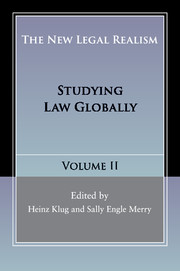Book contents
- Frontmatter
- Dedication
- Contents
- List of contributors
- Preface to The New Legal Realism, Volumes I and II
- 1 Introduction
- Section I The Globalization of Law
- 2 African Constitutionalism From the Bottom Up
- 3 Human Rights Monitoring, State Compliance, and the Problem of Information
- 4 Intellectual Property and the Creation of Global Rules
- Section II The Global Transfer of Norms
- Section III global institutions and the changing roles of judges and lawyers
- Section IV Global Justice
- Index
- References
2 - African Constitutionalism From the Bottom Up
from Section I - The Globalization of Law
Published online by Cambridge University Press: 05 May 2016
- Frontmatter
- Dedication
- Contents
- List of contributors
- Preface to The New Legal Realism, Volumes I and II
- 1 Introduction
- Section I The Globalization of Law
- 2 African Constitutionalism From the Bottom Up
- 3 Human Rights Monitoring, State Compliance, and the Problem of Information
- 4 Intellectual Property and the Creation of Global Rules
- Section II The Global Transfer of Norms
- Section III global institutions and the changing roles of judges and lawyers
- Section IV Global Justice
- Index
- References
Summary
Introduction: Constitutionalism Upside Down
Failure to establish democratic constitutionalist states is not a peculiarly African failure. Working constitutionalist democracies are rare. And in the African context they will be very difficult to build. Four things must be kept in mind from the outset. The first is that the story of constitutionalism in Africa must begin with violence. The second is that the new African states were, after decolonisation, very weak. The legacy of colonial domination left them both without workable institutions and economically powerless; for the first three decades they were used ruthlessly as pawns in the Cold War; and in the last two, as areas for experiments in neoliberalism. The third is that African leaders had agency and choices; some worked to build democratic institutions; others made the decisions that led to the coups, incited the violence and genocide, and profited from the corruption. The fourth is that fifty years of African experience grounds us in a history of multiple (legally skilled, imaginative, and politically brave) attempts to create and to re-create constitutions for democracies and a history of their failures. But in the foreground of our minds must be the enormous numbers of lives lost and the many long terms of imprisonment served, which lie behind the term ‘comparative constitutional law’. The price paid for institutional failure in Africa has been extraordinarily high – the Congo, Nigeria, Sierra Leone, Uganda, Liberia, Ivory Coast, Zimbabwe, Rwanda, Angola, Mozambique, and others. Extremes of political violence, and also famine, are a necessary part of the story of the failure to achieve government by consent.
It may seem odd to start a discussion of constitutionalism by focusing on the violent consequences of its failure, but this is more than a rhetorical flourish. No kind of ‘law’ – constitutional, common, customary, or local, or international human rights law – provides a solution to the violence produced by predation, a disintegrating social compromise, and collapsing states. Over the past half century large numbers of African states have failed to establish legitimate and peaceful governance. This perspective usually leads to a focus, particularly from the standpoint of a lawyer's analysis, on the framework and methods of government, constitutional law, and the culture of constitutionalism, as well as issues of legitimacy and democracy.
- Type
- Chapter
- Information
- The New Legal RealismStudying Law Globally, pp. 13 - 31Publisher: Cambridge University PressPrint publication year: 2016
References
- 2
- Cited by

